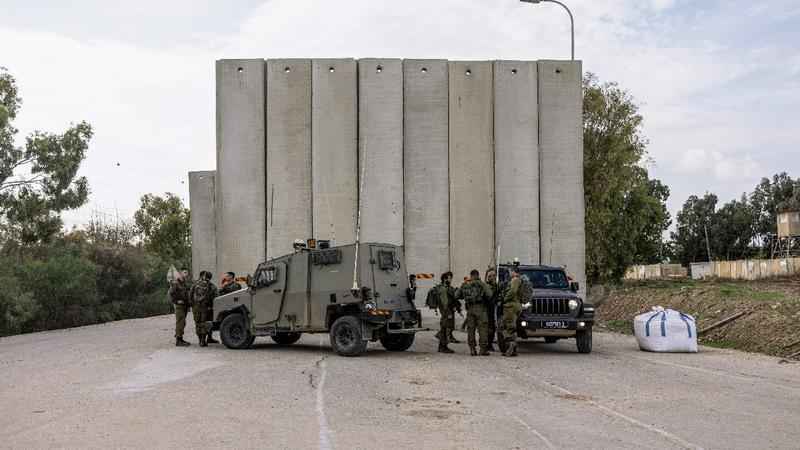Israel strikes Gaza after gunfire wounds civilian near fence

Israeli soldiers deploy on the Israel and Gaza border, Wednesday, Dec. 29, 2021. The Israeli military said a civilian was injured by gunfire from the Gaza Strip, the first instance of cross-border violence along the border of the Palestinian enclave in months. The military said it responded with tank fire at multiple Hamas militant positions in the Gaza Strip.[AP Photo/Tsafrir Abayov]
An Israeli and three Palestinians were wounded on Wednesday in the first exchange of fire in months on the Gaza frontier. The violence came as Israel announced measures aimed at improving living conditions in the occupied West Bank after a rare meeting of top officials.
Israel has announced a number of measures in recent months it says are aimed at easing tensions, but they have had little visible impact on the ground, where attacks by both Israeli settlers and Palestinians are on the rise. There have been no peace talks in more than a decade.
The Israeli military said a civilian near the security fence was lightly wounded by gunfire from Gaza, and that it responded with tank fire at multiple military positions manned by the Hamas militant group, which has ruled the territory since 2007. The Gaza Health Ministry said three Palestinians were wounded, without saying if they were civilians or fighters.
Earlier, Israeli Defense Minister Benny Gantz approved a series of measures aimed at improving relations with the Palestinians after hosting Palestinian President Mahmoud Abbas at his home in Israel late Tuesday.
It was the first time Abbas met an Israeli official inside the country since 2010. The two discussed security coordination between Israel and the Palestinian Authority, which administers pockets of the occupied West Bank.
Gantz’s office said he approved “confidence-building measures,” including the transfer of tax payments to the Palestinian Authority, the authorization of hundreds of permits for Palestinian merchants and VIPs, and approving residency status for thousands of Palestinians in the West Bank and Gaza Strip.
Israel collects hundreds of millions of dollars of taxes on behalf of the PA as part of the interim peace agreements signed in the 1990s.
The tax transfers are a key source of funding for the cash-strapped Palestinians, but Israel has withheld funds over the PA’s payment of stipends to thousands of families that have had relatives killed, wounded or imprisoned in the conflict. Israel says the payments incentivize terrorism, while the Palestinians say they provide crucial support to needy families.
Israel approved residency for some 9,500 Palestinians. Israel controls the Palestinian population registry, and over the years its policies have left an estimated tens of thousands of Palestinians without legal status, severely limiting their freedom of movement, even within the occupied territories. Israel granted legal status to some 4,000 Palestinians in October.
Israeli Prime Minister Naftali Bennett is opposed to Palestinian statehood. His government has shown no interest in reviving peace talks but has said it wants to reduce tensions by improving living conditions in the West Bank.
Recent months have seen a surge in violence by Israeli settlers against Palestinians in the West Bank, as well as Palestinian attacks on Israelis in east Jerusalem and the West Bank.
Gantz’s meeting with Abbas — the second in the six months since Bennett’s coalition government took office — drew vocal criticism from Israeli opposition lawmakers, including those from former prime minister Benjamin Netanyahu’s Likud party, the largest in parliament.
The Palestinians seek an independent state that includes all of the West Bank, east Jerusalem and the Gaza Strip, areas Israel captured in the 1967 Mideast war.
Hamas seized Gaza from Abbas’ forces in 2007, a year after the Islamic militant group won a landslide victory in parliamentary elections. Gaza has been under an Israeli-Egyptian blockade since then.
The Gaza frontier has been mostly quiet since Israel and Hamas fought an 11-day war in May — their fourth since Hamas took over Gaza. Israel holds Hamas responsible for all attacks emanating from Gaza, even those claimed by other armed groups.